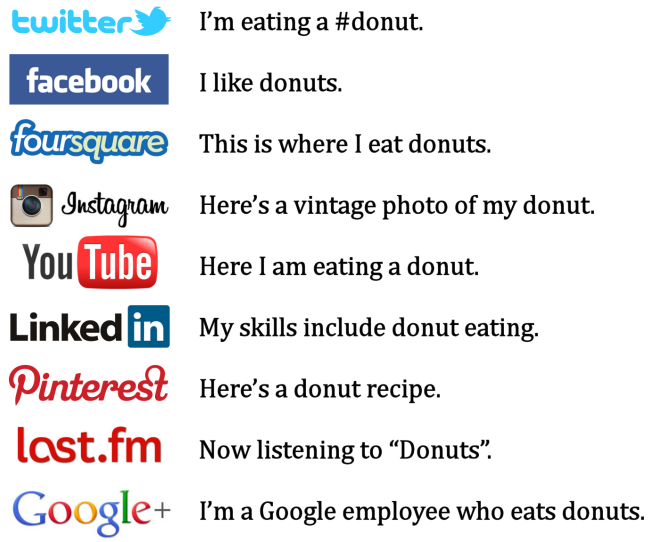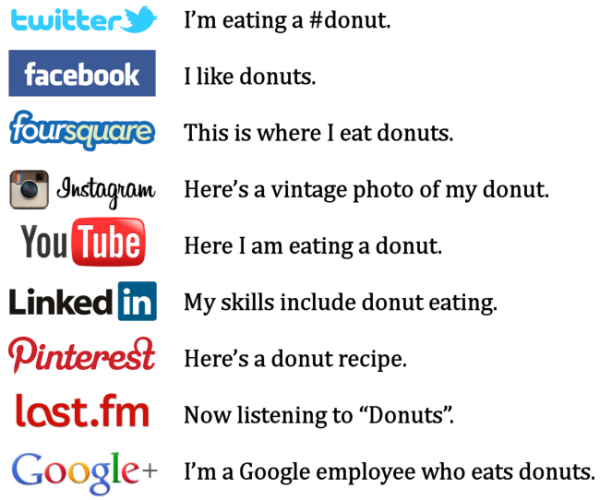
by MIMO Solutions | Internet Marketing, Social Media Explained, Social Networking

I love the “Social Media Explained” meme on the Internet.
Oops, there is nerd-term #1. A “meme” is an ongoing “inside joke” on the Internet. Google “social media explained” in Google images and you will see dozens of versions of the image above. Pardon the pun. People have done this graphic with running, and tons of other substitutes for “donuts.” So a “meme” is a running joke where people do their take on a popular Internet topic. See also “Call me, maybe” or look up any popular YouTube video and you will see hundreds of people with their own versions or spoofs.
 Now back to explaining Google Plus!
Now back to explaining Google Plus!
Here is pretty much everything you need to know about Google+ for business. If you want to have fun and experiment with other things in your free time, go for it!
These are the basics and necessities for companies or professional individuals on Google Plus.
Google+ or “Google Plus”
 I am starting with Google Plus because it now includes Google Places’ local maps and it has been incorporated into Google’s search results with the +1 button. You HAVE TO at least create a personal account and your Local page for your business and make sure they are complete. If you want any traffic or referrals from Google, you just have to figure out how to make Google+ work for you.
I am starting with Google Plus because it now includes Google Places’ local maps and it has been incorporated into Google’s search results with the +1 button. You HAVE TO at least create a personal account and your Local page for your business and make sure they are complete. If you want any traffic or referrals from Google, you just have to figure out how to make Google+ work for you.
Google has also recently added Events to Google+ so you may be able to use this to invite and schedule some cool things. Hangouts are also a feature included that lets you create or join your own chatroom. You can get a group of people online and all “hang out” together much like a video conference or old school “chat room”.
Here is Google Plus explained:
- Google+ is cool because you can add people to “circles” and you don’t have to add people back who add you. This allows you to keep some privacy and separate the groups of people in your life and business.
- Google’s +1 button is basically similar to the “like” button on Facebook. A +1 means you like or are adding your vote of +1 to the topic or website. The more votes you get, the higher the search rankings and the more people see your post.
- Creating your profile and a local page for your business are pretty simple. Google will guide you through the process and even auto-fill some stuff if you have an account there already. Make sure you claim your local business page, because if you are in the phone book, chances are there is already a listing for you.
- Follow the instructions to add your page badge to your website. This helps Google link your account and website together and verify official pages for you business. Also, on you profile pages be sure to include links in the websites or contributor categories for all your social media accounts and websites. This helps Google link all your stuff together and it will improve the search results for your business.
- Finally, start adding people to you circles. The cool thing about circles is that you can pretty much add anyone and as many as you want without getting overwhelmed or over-sharing your privacy, because you can sort them. I recommend 4-5 circles: Family and Friends, Customers, Leads, Acquaintances, and referral partners or team members. That way you can share baby pictures or party pics with friends or family and inside information with team members without sharing it with the world. Just know that “public posts” go to everyone.
- There are no sharing tools or linked accounts with Google Plus yet, so you are going to have to log in and post here separately and update your account on at least a weekly basis.
You can visit the help section or email me with any questions while getting started.
There are not a lot of people officially on Google Plus yet, but the number is growing very fast because so many people have Google accounts for Gmail, YouTube, and their other services. The good news is you get to be on the cutting edge for awhile, and there are plenty of good account names available. Which is a plus for Google.
Stay tuned, over then next few weeks I plan to explain the other social media sites!

by MIMO Solutions | Internet Marketing, Web Design

Steve Montague
Happy Father’s Day, Everyone!
Here are some lessons I have learned my father, and how they apply to Internet marketing. I love you, pops!
Never let money stop you from doing what you want in life.
This was probably the best business lesson my father ever taught me. I think I was around 12 years old, when my father started saying this to me. I wanted to go to the movies or get a new toy, and my father told me to figure out how to earn the money, rather than giving it to me.
As far as internet marketing goes, this is a perfect lesson. Marketing on the web can be free to very cheap. You can start your own website and business for about $15, and look very professional. It gives everyone equal opportunity to earn money and do what they want. You can build a website for anything and dive into your passions with very little investment. You can be anyone and do anything on the internet. The question then becomes what do you want in life.
Work smart and hard.
A lot of people thing this one is “work smart, not hard,” but my dad taught me that if you can do both, the sky is the limit.
The same goes for internet marketing. Some people work hard and write thousands of posts. Some people try to produce a few really great pieces of content. Why can’t you have thousands of really compelling posts and status updates? If you work smarter and harder then everyone, no one can beat your audience.
Save up to half of what you earn.
This is a very difficult lesson to learn and practice. My grandfather never made more than $30,000 a year at a job in his life. He died in 2006 as a multi-millionaire. Saving gives you options other people don’t have to invest or take advantage of future opportunities.
On the Internet, you have to realize that making money is the key to longevity in business, and saving as much as you can allows you to invest in opportunities others can’t afford. When you are pricing your services, you have to remember the government takes a third, then you pay yourself half by saving it, and whatever is left is what you get to spend or reinvest.
Have faith that things will work out, and always be optimistic.
Do you look for ways things won’t work, or do look for ways to make things happen? There are 12 ways to solve any problem. Go find one. That is one of my dad’s favorite quotes. Yogi Berra said, “It ain’t over til it’s over.”
In internet marketing, the same applies. Anything is possible, so long as you keep trying. A website is never finished, and there is no problem you can’t solve. Sure, it might take longer or be more expensive than you wished, but there is a way to make your dreams come true. Go find it!!!
Take personal responsibility for things, even if they are not your fault.
Another tough lesson, but it makes life a lot easier, you a lot happier, and other people love and respect you more. I will never forget when my dad would ask me if I wanted to do something before he gave permission. For example, if my friends asked me to spend the night at their house, he would take me aside and ask quietly, “Do you want to?” If I said yes, he would say I could. If I said, no he would say we had plans at home and I couldn’t go this time. He didn’t care if some other teenagers liked him, but I did, so he would take responsibility for the decision for me.
On the world wide web, you will come across customer complaints, frustrated employees, and competitors lashing out. It is best policy to take responsibility and resolve the issue, rather than prove you are right. Things can go viral and get out of control very fast. One customer can tell millions of people about an experience within minutes. Keep that in mind, and decide now that it is your responsibility to protect your reputation online. No one else can do that for you anyway.
Don’t judge a book by its cover, but realize that other people will.
My dad went to college in the early 70’s and graduated with long hair, a beard, and some very bad and very loud plaid suits. He learned pretty fast that you should never judge other people by their appearance, but other people are always judging you. My dad’s favorite story is when a client asked him for his jacket, then threw it in the trash outside his office, before continuing with the sales call.
The lesson on the internet, is that you have between 5-8 seconds to make an impression on a visitor. Google has done the research and people who do not like what they see in the first 8 seconds will go back to the search and check out the next site. It is a brutal reality, but you have to be extremely prepared for this. It doesn’t mean that you need to spend $30,000 on a web design, but you do have to match your visitors expectation. It means you have to give your visitors what they are looking for in a package they want, and do it very quickly.
I have learned a lot more lessons from my father, but these are a few that I remember most today. I hope it helped you with your approach, and I hope you have a great Father’s Day!
What have you learned about business from your father?
Please share in the comments below…

by MIMO Solutions | Internet Marketing, Web Design
I hear so many mis-conceptions and perceptions about search engine optimization, that I decided to put them down in a blog post to save everyone time and headaches.
Many business owners don’t have the time to study SEO and what it means for their website, so they have to rely on the opinions of their people or sales people for SEO companies. Both of those types have a vested interest in telling you what you want to hear or making themselves sound more valuable…
No offense, but I don’t really care if you listen to my advice or not, so here is the truth as I see it right now. The internet changes daily, but I will try to keep an eye on this post and keep it updated.
Here is what every business owner needs to know about Search Engine Optimization – Hint: Also know as, SEO.
 Myth #1 – SEO will get you ranked on the first page of Google.
Myth #1 – SEO will get you ranked on the first page of Google.
Everyone wants to tell you that you need to spend $1,500 a month on SEO and that magic SEO wizards will tweak your site, then magically it will rise in the search engine rankings until they hit #1. Well, guess what, they are all full of crap.
It is true that you probably can’t get to #1 for a competitive keyword without doing some SEO. However, just stuffing some keywords in the page isn’t going to make it happen. There are way too many ranking factors for it to make much of a difference. Search engines like Google take into account 100’s of factors when selecting #1 and the stuff on the page is only part of it.
Back in the 90’s, keywords were the deciding factor. If you had more keywords in the right places than other sites, you would rocket up the charts. The search engines didn’t have much else to go on. The porn industry and other spammers knew this, so they stuff pages with keywords that had nothing to do with what they actually did just to get traffic. Google and others quickly figured out that they couldn’t take your word for it.
A few years ago, Google even admitted in a legal case that they don’t even use the keyword tag at all any more. They still take into account some other SEO factors like: title of the page, address, header tags, image tags, and a little content, but they know better than to trust the person who built the site. People lie to get ahead.
In fact, they started penalizing sites that did too much keyword stuffing on their page, so don’t screw that up or you can actually go down in the search rankings!
So in conclusion, it does help to let Google know what you are trying to rank for by having the key phrases in the right places, but that alone will not get you to where you want to go.
 Myth #2 – Search Engine Optimization uses key words to improve your ranking.
Myth #2 – Search Engine Optimization uses key words to improve your ranking.
This one is a little confusing, but I will try to explain. Originally, in the 90’s is was “key words” that helped you. As the search engines improved and millions more websites were built, it became necessary to use “key phrases” instead.
Sure it would be nice to rank for the keyword “tires” if you sell tires, but in all reality, unless you are at Goodyear, that is probably not going to happen. If you own a local tire store, you are going to have to focus on 3-5 word key phrases.
Key phases are also know as “long-tail keywords.” It has been hard to eliminate the word “keywords” from our Internet culture, so some people added the long-tail to more accurate describe what we are doing in SEO these days.
When you think about what you would like to be ranked for, finding a few good key phrases is very important. Most people just take the single keyword and add their location for local searches, for example, “tires kansas city.”
That may work depending on the amount of competition in your local marketing, but it usually helps to focus a little narrower. Something like “buy new tires kansas city” or “tire store in kansas city” or “tires on sale kansas city” will typically do much better.
My advice is to get hyper focused on your products. If you focus your efforts on “Goodyear 18 inch all purpose radials kansas city,” you should find it very easy to rank on the first page. There is also an added benefit. It cuts out all the people who are just looking around, and it only sends you people who are ready to buy!
Some people get frustrated and tell me that no one is searching for “Goodyear 18 inch all purpose radials kansas city” and there are thousands of people searching for “tires” or “tires kansas city.” While that may be true, I need you to think about how you search for things for a moment. Most people will do 2-3 searches before they actually find what they need and they get longer and more targeted each time, plus searches for generic keywords comes with a lot of researchers, image searchers, and unqualified buyers.
It is OK to miss out on someone searching for a picture of a tire. It is not OK to miss out on someone looking to buy “Goodyear 18 inch all purpose radials in kansas city” today.
 Myth #3 – Google is a search engine.
Myth #3 – Google is a search engine.
Sure, Google calls itself a search engine and most people go to Google to search for stuff, but that is not what is important to Google. They take this stuff very seriously!
Google is a “referral” engine.
This is the easiest way I know to explain what Google does to a business owner. Google is in the business of referring people to the best place to get what they are looking for. Search engine implies some kind of impartial list of results, and that the search is in charge. When in fact, Google has said point blank, they do not treat all websites and searches the same, and they want to protect the user experience by getting them to answers as soon as possible.
I have good news and bad news. The bad news is Google doesn’t care about you or your website at all. They are in the business of referring people to the best sites as quickly as possible, wherever that may be. The good news is they don’t care about your competitor either, so let’s talk about what that means for you.
If you want to get qualified referrals from Google, there are things you can do to make yourself more credible to them. That is really what they want to know from any website they are trying to rank. Can they trust you?
Here are some things they look at:
- How long have you been around?
- How many other sites link to yours? (Other referrals)
- How trustworthy are the sites you link to and that link to you?
- How professional is your website?
- How quickly does it load?
- Do you differentiate each page to help them tell which page is best for each search?
- How far out did you buy your domain name, or do you think you might be gone next year?
- Do you have social media accounts and other online profiles?
- How many pages are in your site?
- How educational is your content?
- How do you label pictures and how many do you have?
- How many positive reviews do you have?
- Where is your physical location?
- How many comments and subscribers do you have?
The key is to treat Google like a real-life referral partner. You have to build trust over time, and develop the relationship. You have to monitor your online reputation and doing this in each one of those categories to improve your standing in the online community. Google needs to know, like, and trust you just like any other referral partner.
If you take that approach, you will consistently move up in the rankings, and never down. Some people try to mislead Google by buying a bunch of links from other sites, over-stuffing keywords, and partnering with other sites that do things to push the envelope. Those people will eventually be penalized as Google gets better at refining their criteria, and improving the results. Just like in real life, if you hang out with a bunch of crooks, eventually people will see you as one, regardless of whether you actually do anything wrong.
Conclusion – Take the time to build a strong online reputation, and forget about magic keywords.
Just like building a brick-and-mortar business in real life, there are no shortcuts or magic bullets. It takes time, energy, and resources. Fortunately, it takes a lot less money online than it does in the real world. All of the things I mentioned above are free if you take the time to learn how to do them. If you hire an Internet marketing professional, they cost money but with the right professional you can make Google and the other search engines your number one referral partner, and build a strong online business.
Search engine optimization has the highest return on investment of any type of marketing activity!
If you need help understanding anything on this post, please comment or email me and we can talk it out. I love helping business owners figure out how to do it right, since so many seem to be doing it wrong.

by MIMO Solutions | Internet Marketing, Smarketing Blog, Social Networking
I began working with local owners of 6 radio stations about two years ago. The sites had broken links, missing images, alignment issues, and several pages with outdated information. They only sent email blasts when they happened to sell a sponsor for one. Also, the company gave away banner ads on their homepage as added value to advertising packages on the radio. They had the ability to simulcast on the internet for 4 of the 6 stations, but the links were hidden on content pages or broken. In all fairness, they had no one to do the work and no budget because the websites were losing money.
Initially, we sat down and evaluated the most glaring needs. We repaired all the broken links, images, and pages. We started with the worst sites and worked through them one by one up to the best looking and most effective site. The website traffic and listenership jumped up 20-40% for every station the month following the updates. After we knew we were not causing any more damage to our online reputation, we started laying out a plan to rebuild the sites and our marketing plan to grow their audience and revenue.
We decided the target audience was the local public and listeners of their stations with a secondary target of advertisers trying to reach these visitors. After some brainstorming and research, we put together a marketing plan to attract these targets and create relationships with them.
Some of our plan included:
- Making listening online as easy as possible.
- Providing local information such as news, traffic, weather and gas prices online.
- Making listener registration for email blasts as easy as possible with subscribe and unsubscribe links.
- Sending email blasts every Wednesday with information, coupons, and advertisements.
- Redefining online advertising as non-traditional revenue, instead of free added value.
- Setting uniform sizes and pricing for ads so they were easier to sell.
- Incorporating the websites in all on-air contests and promotions.
- Creating blogs and content that could be easily updated.
- Creating recruitment pages for job seekers and employers as a new revenue stream.
Finally, we redesigned the sites with a completely new designs and new content, even a new operating platform. All 6 stations now stream online and have links to listen live on their homepages. The sites were re-launched to public and promoted heavily on the air, on promotional products, and other marketing materials. The company now has a plan for how to attract visitors, maintain their websites, and sell advertising. Most importantly with the new sales generated online, they can afford to update and grow their website.

 Now back to explaining Google Plus!
Now back to explaining Google Plus! I am starting with Google Plus because it now includes Google Places’ local maps and it has been incorporated into Google’s search results with the +1 button. You HAVE TO at least create a personal account and your Local page for your business and make sure they are complete. If you want any traffic or referrals from Google, you just have to figure out how to make Google+ work for you.
I am starting with Google Plus because it now includes Google Places’ local maps and it has been incorporated into Google’s search results with the +1 button. You HAVE TO at least create a personal account and your Local page for your business and make sure they are complete. If you want any traffic or referrals from Google, you just have to figure out how to make Google+ work for you.




 Myth #1 – SEO will get you ranked on the first page of Google.
Myth #1 – SEO will get you ranked on the first page of Google. Myth #3 – Google is a search engine.
Myth #3 – Google is a search engine.
